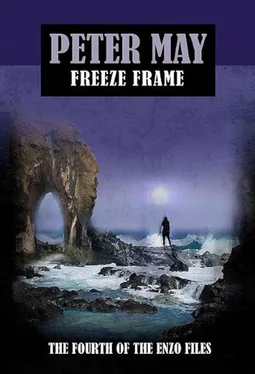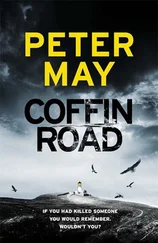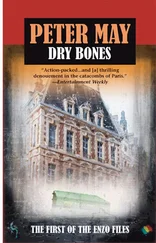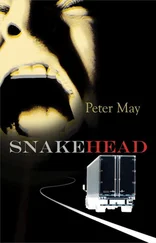Peter May - Freeze Frames
Здесь есть возможность читать онлайн «Peter May - Freeze Frames» весь текст электронной книги совершенно бесплатно (целиком полную версию без сокращений). В некоторых случаях можно слушать аудио, скачать через торрент в формате fb2 и присутствует краткое содержание. Жанр: Классический детектив, на английском языке. Описание произведения, (предисловие) а так же отзывы посетителей доступны на портале библиотеки ЛибКат.
- Название:Freeze Frames
- Автор:
- Жанр:
- Год:неизвестен
- ISBN:нет данных
- Рейтинг книги:5 / 5. Голосов: 1
-
Избранное:Добавить в избранное
- Отзывы:
-
Ваша оценка:
- 100
- 1
- 2
- 3
- 4
- 5
Freeze Frames: краткое содержание, описание и аннотация
Предлагаем к чтению аннотацию, описание, краткое содержание или предисловие (зависит от того, что написал сам автор книги «Freeze Frames»). Если вы не нашли необходимую информацию о книге — напишите в комментариях, мы постараемся отыскать её.
Freeze Frames — читать онлайн бесплатно полную книгу (весь текст) целиком
Ниже представлен текст книги, разбитый по страницам. Система сохранения места последней прочитанной страницы, позволяет с удобством читать онлайн бесплатно книгу «Freeze Frames», без необходимости каждый раз заново искать на чём Вы остановились. Поставьте закладку, и сможете в любой момент перейти на страницу, на которой закончили чтение.
Интервал:
Закладка:
“Anyway, Fleischer was Heim’s assistant, and for several months in 1941 they carried out the most horrific experiments on Jewish prisoners at Mauthausen. They injected numerous substances directly into their hearts just to see what physical reactions they might cause. Things like petrol, water, various poisons. The eyewitness account of a Mauthausen survivor told of a young eighteen-year-old boy being taken to their clinic with inflammation of the foot. Fascinated by his level of fitness, they discovered that he played football. But instead of treating the foot inflammation, they anaesthetised him, opened him up, dissected one kidney, removed the other, then castrated him. Finally he was decapitated, and Heim boiled the flesh off the skull so that it could be put on display.”
Enzo felt the hairs stand up all over his body, raised by a mix of anger and revulsion, and he washed the bad taste quickly from his mouth with another gulp of beer.
“Heim went on to another camp at Ebensee, near Linz, and ended up in Finland. Fleischer went to the Majdanek concentration camp near Lublin, in Poland, where he earned the nickname of The Butcher. He continued his experiments on prisoners with various forms of poison and surgery, before being assigned to a field hospital on the eastern front. After the war he went back to Bavaria and set up a very successful gynaecology practice in Munich.”
Cohen glanced nervously from the window and took several more mouthfuls of beer.
“The war crimes people finally caught up with him in 1951. But the Nazis still had a well-oiled early warning system and escape network in those days. He was tipped off and got away, leaving behind him a wife and two children.”
“He just disappeared?”
“At first, yes. It took investigators nearly ten years to find him again. But we’re pretty sure they did. Our operatives tracked him down finally to the Moroccan seaport of Agadir. He had given up his medical status and was working under the name of Yves Vaurs as the manager of the city’s fishmarket. They had been watching him for several weeks, photographing him, making comparisons with photographic evidence already possessed, before deciding to move in.”
And suddenly everything started falling into place for Enzo. He said, “On the night of February 29, 1960, right?”
Cohen blinked beady, suspicious eyes at him. “How do you know that?”
“I’ll tell you in a moment, Monsieur Cohen. What happened that night?”
“Well, I’m assuming you’re aware that an earthquake destroyed most of the town.”
“Yes.”
“All three operatives died in the quake. Missing, presumed dead.”
“And Fleischer?”
“As far as we knew, he was also killed. His apartment block in the old kasbah was completely destroyed. There were no survivors from that building.”
“So you stopped looking for him?”
“We would have pursued him all the way to hell and back, Monsieur Macleod. But death robbed us of that option. Case closed.”
“Until Adam Killian contacted you.”
“Well, he didn’t come to us with any fresh information, if that’s what you mean. But he did arouse our interest, yes.”
“What did he say?”
“When he first wrote he was just looking for information about Fleischer. He didn’t say why. I sent him the standard background that we put out to the press when we believed he was still alive. We had several exchanges, then, before he telephoned me at the centre one day, asking if he could meet me here in Paris.”
“Why did he want to meet you?
“Because, as with you, monsieur, there was a limit to how much I was prepared to give out by mail or by telephone.” He drained his glass. “I could do with another of these.”
Enzo caught the attention of the barman and ordered another two glasses of beer.
Cohen waited until he had a fresh glass in his hand before he continued. “He was interested to see any photographs we had of Fleischer.”
“And you were able to show him some?”
“I let him see some of those we had in the file. Fleischer was still a young man, then, of course. Killian spent a long time looking at them, and then asked if he could keep them.”
“You gave him copies?”
“No, monsieur, I did not. He was very disappointed. But we were not prepared to let them pass into general circulation.”
“Did he say why he was so interested in Fleischer?”
“No, he wouldn’t tell me.”
“Did you arrive at any conclusions about that yourself?”
“It seemed to me pretty clear that he thought he had found Fleischer and was looking for some way to confirm his identity.”
“But you didn’t take that too seriously?”
“No, monsieur. We used to be inundated with claimed sightings. Most of them, of course, were either fanciful or malicious. Besides… Fleischer was dead.” He paused, swirling his beer around in his glass, staring into the bubbles that foamed to the surface. “He wanted to know if we had any other means of confirming Fleischer’s identity. Other than photographic comparison, that is.”
“And did you?”
Cohen raised his eyes to scrutinise the Scotsman’s face, hesitating for a moment, as if pondering whether or not to respond with the truth. Finally he said, “Yes, we did.” He paused. “And still do.”
“How?”
“At Mauthausen, monsieur, there was a young prisoner who had trained as a hairdresser. He was assigned to cut the hair of the SS officers who ran the camp. And because he made such a good job of it, they kept him alive. An older prisoner, a lecturer in science at the University of Vienna before the war, persuaded him to smuggle out a lock of hair from each of the officers. These were preserved, notated, dated and hidden. The old professor believed they would provide an ideal way of proving the identity of these criminals after the war.”
Enzo nodded. For decades, examination of hair under a comparison microscope had provided forensic scientists with a good, although not foolproof, basis for identifying both victims and criminals.
“And he was right. Although the old professor did not survive the camps himself, the young barber and his hair clippings did. And they were used, along with photographic evidence and eyewitness accounts, to convict several war criminals in the years that followed.”
“And you still have a sample of Fleischer’s hair?”
“We do. Monsieur Killian and I went on to exchange several letters on the subject. He was anxious to ascertain that the hair would be available for scientific testing, if requested.”
Enzo sat back in his chair and raised his eyes toward the ceiling. Suddenly the note Killian had scribbled on the shopping list on the fridge door made absolute sense. A bit of the flood will boil the feast. Which, with the Spoonerism reversed, translated as, a fit of the blood will foil the beast. Somehow Killian had obtained a DNA sample from the man he suspected to be Erik Fleischer. Although still in its infancy in 1990, DNA comparison was already being employed by forensic investigators to identify criminals. Killian had worked in the field of tropical medical genetics, so he would have been only too familiar with the technology. A simple comparison of mitochondrial DNA between the hair and the suspect would have provided definitive proof of identity.
His mind was flitting with butterfly randomness among myriad thoughts flooding his brain. Killian would have needed a sizeable sample to make the comparison. Somehow he must have got that. But how? And where had he hidden it? He opened his eyes again to find Cohen watching him.
“You think Fleischer didn’t die in Agadir?” the old man said.
“Adam Killian was certain he didn’t.”
“So you believe he found someone that he thought to be Fleischer?”
Читать дальшеИнтервал:
Закладка:
Похожие книги на «Freeze Frames»
Представляем Вашему вниманию похожие книги на «Freeze Frames» списком для выбора. Мы отобрали схожую по названию и смыслу литературу в надежде предоставить читателям больше вариантов отыскать новые, интересные, ещё непрочитанные произведения.
Обсуждение, отзывы о книге «Freeze Frames» и просто собственные мнения читателей. Оставьте ваши комментарии, напишите, что Вы думаете о произведении, его смысле или главных героях. Укажите что конкретно понравилось, а что нет, и почему Вы так считаете.












